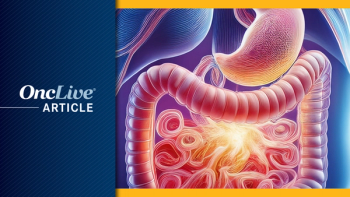
Single-Agent Belantamab Mafodotin Elicits Activity in Heavily Pretreated Patients With R/R Myeloma
Belantamab mafodotin monotherapy demonstrated anticancer activity with a tolerable safety profile in heavily pretreated patients with relapsed or refractory multiple myeloma.
Belantamab mafodotin-blmf (Blenrep) monotherapy demonstrated anticancer activity with a tolerable safety profile in heavily pretreated patients with relapsed or refractory multiple myeloma, according to a real-world analysis presented at the 19th International Myeloma Society Annual Meeting.1
Findings showed that at a median follow-up of 11.9 months (95% CI, 10.0-13.8), the median progression-free survival (PFS) was 4.7 months (95% CI, 3.5-5.9) for all evaluable patients. Specifically, the median PFS was 8.8 months (95% CI, 6.6-10.9) for those achieving a partial response or better.
Patients with multiple myeloma who are refractory to proteasome inhibitors, immunomodulators (IMiDs), and anti-CD38 therapies have a poor prognosis. However, BCMA expression can prompt a longer survival time of plasma cells, and BCMA expression tends to be higher in patients with relapsed or refractory multiple myeloma.
In August 2020,
Investigators sought to assess belantamab mafodotin for heavily pretreated patients in a real-world setting to compare outcomes with those observed using the often selective parameters of a clinical trial. Protocols tend to exclude some patients because of comorbidities or age.1
Investigators evaluated patients who received belantamab mafodotin through the GlaxoSmithKline expanded access compassionate care program to examine the efficacy and tolerability of the agent in a real-world setting at 12 Israeli care sites.
The analysis included 106 patients with relapsed or refractory multiple myeloma who received a minimum of 2 doses of belantamab mafodotin. Investigators extracted data from the medical charts of patients, focusing on demographics, disease characteristics, prior treatment, safety, and ocular toxicity responses.
The primary end point of the study was PFS. Key secondary end points included overall response rate (ORR), overall survival (OS), tolerability, and safety, with a focu on ocular toxicity.
Among all evaluated patients, the median number of doses administered was 4 (range, 2-17). Notably, 80% of patients received belantamab mafodotin at doses of 3.4 mg, and 20% were given belantamab mafodotin at doses of 2.5 mg.
The median age of patients treated was 69 years (range, 36-88), 43% had high risk cytogenetics, and 21% had extramedullary disease. International Staging System (ISS) score included 1 (43%), 2 (30%), and 3 (26%), and revised ISS score included 1 (33%), 2 (51%), and 3 (15%).
The median prior lines of therapy was 6 (range, 2-11), and patients had prior exposure that included bortezomib (Velcade; 97%), carfilzomib (Kyprolis; 73%), lenalidomide (Revlimid; 92%), pomalidomide (Pomalyst; 77%), daratumumab (Darzalex; 95%), and high-dose melphalan/autologous stem cell transplant (59%). Seventy-three percent of patients were triple-class refractory, and 32% were penta-drug refractory.
Additional data showed the median OS of all patients was 14.5 months (95%, CI 9.5-19.6). Notably, the median OS was not reached among patients who achieved at least a partial response (PR) compared with 7.1 months for patients who did not experience a response (P < .001).
The ORR was 45%, with 4% of patients achieving a complete response, 14% having a very good PR, and 27% experiencing a PR. Additionally, 19% of patients had stable disease, and 26% experienced progressive disease.
Regarding safety, 56% of patients experienced dose delays. Furthermore, 27% of second and beyond doses were delayed, primarily due to ocular toxicity. Ocular toxicity occurred in 66 of 95 evaluable patients (69%). Rates of ocular toxicity included grade 1 (12%), grade 2 (17%), grade 3 (40%), and grade 4 (1%). Of note, 63% of patients who experienced ocular toxicity has their symptoms reduced to grade 0 or 1 during follow-up.
Treatment discontinuation because of adverse effects (AEs) was documented in 3.8% of patients, and they were all related to ocular toxicity. Two patients died due to AEs related to treatment with belantamab mafodotin. Causes included sepsis and pneumonia in 1 patient each.
Nonocular AEs observed included thrombocytopenia (27%, any grade; 18%, grade 3 or higher), infection (11%; 7.5%), and anemia (11%; 4%).
References
- Shragai T, Magen H, Lavi N, et al. Update of real-world experience with belantamab mafodotin therapy for relapsed/refractory multiple myeloma: a multi-center retrospective study. International Myeloma Society Annual Meeting; August 25-27, 2022; Los Angeles, California. P-114
- FDA approves GSK’s BLENREP (belantamab mafodotin-blmf) for the treatment of patients with relapsed or refractory multiple myeloma. News release. Published August 5, 2020. Accessed August 30, 2022.
https://bit.ly/3gxEXB1 - Lonial S, Lee HC, Badros A, et al. Belantamab mafodotin for relapsed or refractory multiple myeloma (DREAMM-2): a two-arm, randomised, open-label, phase 2 study. Lancet Oncol. 2020;21(2):207-221. doi:10.1016/S1470-2045(19)30788-0



































